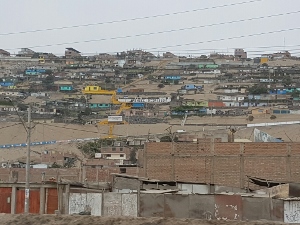 Lying at the outskirts of Lima is a district that takes its name from the pre-Inca Sanctuary built in Pachacamac (in the quecha language meaning ”god who created the earth”). «We got here with the objective of starting up a business run according to the practices of the Economy of Communion (EoC), the profits of which are able to support a rehab center for children saved from the streets and with drug addiction problems, » recounted Germán Jorge of the EoC Argentina. The Mundo Libre Institute is the only one of its kind existing in Perù today. It has been awarded international recognition for the professionalism with which it has performed its activities, but despite the possibility to host 100 children, today it supports only 40 due to lack of resources. Its foundress, Marilú Gonzalez Posada, has lived for 32 years with this objective. Her great concern regards the Institute’s sustainability, a problem common to all the social organizations that are unable to survive only on the generosity of people and international cooperation. One of the laboratories of Mundo Libre produces typical Peruvian sweets: the “chocotejas.” «The business plan we are working on, specifically involves this project to be implemented at the end of 2017, together with Solidarpole (which promotes different solidarity business projects and has proposed that the Economy of Communion be the choice) and AMU Luxembourg (that offered finances for the renovation of a barn and purchase of machinery). We now have to coordinate the resources. It is a challenge to EoC that has a lot to offer, and a communion which is not “imposed” but “generated” in response to a first free decision. This is what we have tried to do with each person we encounter along the way this week.». When the armed Spanish arrived on horseback in these lands to conquer the Pachacamac Totem – the indios who had never seen horses before, believed they were the gods who had come to replace their god, and did not counter with any resistance. History has left its mark on their culture. «We could see this in the relational difficulties. So our main commitment was to give room to all, in the effort to break the logic of the “European conquistador” (or the descendants of these), and of passive and underdog aborigines. As the days passed, and on the basis of relationships of trust which slowly developed, we started to overcome these relational dynamics and build new rapports of reciprocity.»
Lying at the outskirts of Lima is a district that takes its name from the pre-Inca Sanctuary built in Pachacamac (in the quecha language meaning ”god who created the earth”). «We got here with the objective of starting up a business run according to the practices of the Economy of Communion (EoC), the profits of which are able to support a rehab center for children saved from the streets and with drug addiction problems, » recounted Germán Jorge of the EoC Argentina. The Mundo Libre Institute is the only one of its kind existing in Perù today. It has been awarded international recognition for the professionalism with which it has performed its activities, but despite the possibility to host 100 children, today it supports only 40 due to lack of resources. Its foundress, Marilú Gonzalez Posada, has lived for 32 years with this objective. Her great concern regards the Institute’s sustainability, a problem common to all the social organizations that are unable to survive only on the generosity of people and international cooperation. One of the laboratories of Mundo Libre produces typical Peruvian sweets: the “chocotejas.” «The business plan we are working on, specifically involves this project to be implemented at the end of 2017, together with Solidarpole (which promotes different solidarity business projects and has proposed that the Economy of Communion be the choice) and AMU Luxembourg (that offered finances for the renovation of a barn and purchase of machinery). We now have to coordinate the resources. It is a challenge to EoC that has a lot to offer, and a communion which is not “imposed” but “generated” in response to a first free decision. This is what we have tried to do with each person we encounter along the way this week.». When the armed Spanish arrived on horseback in these lands to conquer the Pachacamac Totem – the indios who had never seen horses before, believed they were the gods who had come to replace their god, and did not counter with any resistance. History has left its mark on their culture. «We could see this in the relational difficulties. So our main commitment was to give room to all, in the effort to break the logic of the “European conquistador” (or the descendants of these), and of passive and underdog aborigines. As the days passed, and on the basis of relationships of trust which slowly developed, we started to overcome these relational dynamics and build new rapports of reciprocity.»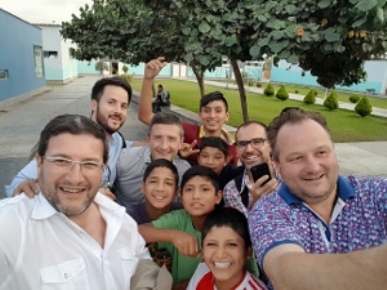 The «Formulation of the “Business administration guidelines” helped in setting the person at the core of economic activities, without foregoing professionalism and the efficiency necessary to reach the targets. After passing days together, our interlocutors at the Mundo Libre Institute said that they already felt part of the Economy of Communion project, which in a sense, they had already unconsciously put into practice and which they now want to propose to their own employees and also educate the youth in these principles. ‘This is our challenge in 2017’». «The horses not originating from Perù, had to develop the capacity to walk on sand in these desert zones. Throughout these 500 years an equine breed has developed with the characteristic concentric-circles gait which allows them to move freely in these environments. We are like the first horses and are making a big effort to learn how to live the “culture of giving” in communion. But if we develop these abilities, many others will slowly follow in many parts of the globe. They will carry this new culture in their blood, and will succeed in changing the world.» Gustavo Clariá
The «Formulation of the “Business administration guidelines” helped in setting the person at the core of economic activities, without foregoing professionalism and the efficiency necessary to reach the targets. After passing days together, our interlocutors at the Mundo Libre Institute said that they already felt part of the Economy of Communion project, which in a sense, they had already unconsciously put into practice and which they now want to propose to their own employees and also educate the youth in these principles. ‘This is our challenge in 2017’». «The horses not originating from Perù, had to develop the capacity to walk on sand in these desert zones. Throughout these 500 years an equine breed has developed with the characteristic concentric-circles gait which allows them to move freely in these environments. We are like the first horses and are making a big effort to learn how to live the “culture of giving” in communion. But if we develop these abilities, many others will slowly follow in many parts of the globe. They will carry this new culture in their blood, and will succeed in changing the world.» Gustavo Clariá
Have the courage to start again
Have the courage to start again

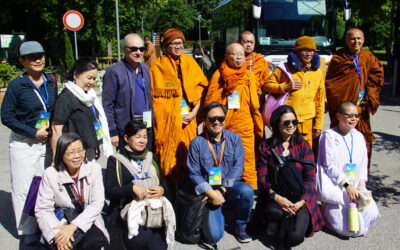
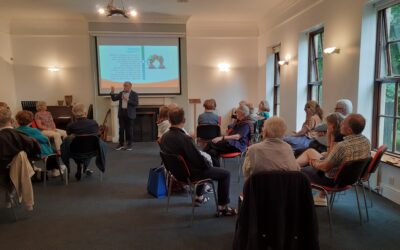
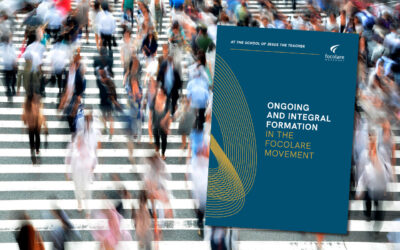
0 Comments